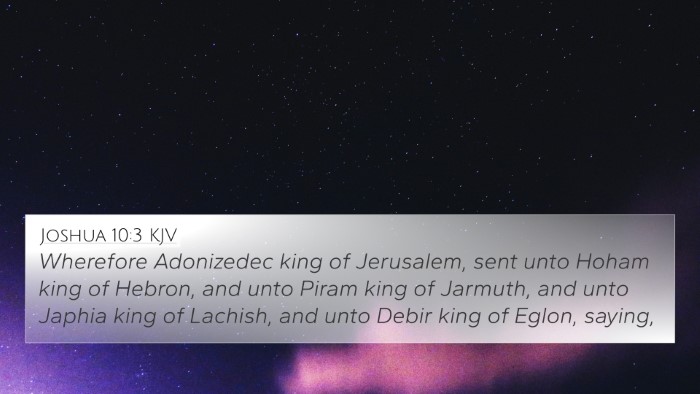Understanding Joshua 12:11
Joshua 12:11 states: "And the king of Jabneh, one; the king of Libnah, one;". This verse is part of the broader context detailing the conquests and victories of the Israelites in the land of Canaan. In this passage, we find notable historical and spiritual significance.
Verse Summary
This verse lists the defeated kings during the Israelites' conquest, emphasizing God's support in their victories. The specific mention of the king of Jabneh and the king of Libnah serves to illustrate the comprehensive nature of Israel's campaigns, highlighting the destruction of opposing powers and the establishment of Israel's dominance in the promised land.
Commentary Insights
Matthew Henry’s Commentary
Matthew Henry notes that the enumeration of defeated kings serves both as a historical record and an encouragement to the Israelites. It reminds them of God's faithfulness and the physical evidence of their covenant relationship with Him through their victories.
Albert Barnes’ Commentary
Albert Barnes emphasizes the significance of naming these kings, as it sets a precedent for understanding the larger scope of Israel’s conquests. It also highlights the completion of God’s promises, showing that the land, once occupied by adversarial forces, is now secured under the leadership of Joshua.
Adam Clarke’s Commentary
Adam Clarke discusses the geographic and political importance of Jabneh and Libnah. He points out that these cities were strategically significant, and their capture marked a crucial step in Israel’s conquest, providing theological implications about God aiding His people against their enemies.
Thematic Bible Verse Connections
Joshua 12:11 demonstrates numerous thematic and scriptural connections to other parts of the Bible. These include:
- Deuteronomy 3:1-7 - The accounts of kings defeated by Moses and the establishment of territories.
- Joshua 10:29-39 - Other kings defeated by Joshua that parallel the listing of Jabneh and Libnah’s kings.
- 1 Samuel 17:52 - The Israelites’ continued battles against the Philistines which underline the ongoing conflict with local rulers.
- Psalm 44:2 - A reminder that it was God who brought their defeats and secured victories as stated in the Psalms.
- Matthew 28:18 - The authority of Christ over all kingdoms, linking the conquest in Joshua to the ultimate victory in the New Testament.
- Romans 8:37 - The assurance of Christians that they are more than conquerors through Him who loved them.
- Hebrews 11:32-34 - A reflection on how faith inspired the Hebrew forefathers to conquer kingdoms.
Exploring Cross-References
Cross-referencing is a vital tool for understanding Biblical texts. Here are ways to utilize cross-references while studying Joshua 12:11:
- Using a Bible Concordance: Look for related themes and verses based on keywords.
- Cross-Reference Bible Study: Create comparisons between various passages regarding Israel’s conquests.
- Scriptural Cross-Referencing: Connect Old Testament historical events with New Testament teachings regarding victory and faith.
Conclusion
The narrative of Joshua 12:11 serves not only as a historical account but also as an encouragement to the faithful about God’s enduring sovereignty and provision. Through understanding this verse in the context of other biblical passages, one finds greater depth in God’s overarching narrative of redemption and victory.




